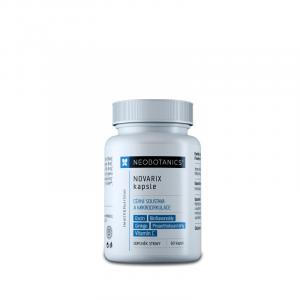
How to Recognize Vitamin B6 Deficiency and What to Do About It

What Causes Vitamin B6 Deficiency and How to Recognize It?
Vitamin B6, also known as pyridoxine, is one of those unobtrusive nutrients that aren't often talked about, yet its importance to health cannot be understated. Vitamin B6 deficiency can surprisingly present a wide range of symptoms, from fatigue to more serious neurological issues. In today's fast-paced world, where stress is a daily occurrence and a balanced diet is more the exception than the rule, more and more people are encountering this problem. How can you recognize a vitamin B6 deficiency, what causes it, and how can it be prevented?
Why Is Vitamin B6 So Important?
Vitamin B6 plays a key role in many bodily functions. It helps in the production of neurotransmitters, which enable communication between nerve cells, participates in protein metabolism, and contributes to the formation of red blood cells. It is also important for the proper functioning of the immune system and regulating homocysteine levels, an amino acid associated with the risk of heart disease.
Without sufficient amounts of vitamin B6, the body wouldn't be able to efficiently process nutrients or protect itself against infections. And because its role is so extensive, the symptoms of its deficiency can manifest in very diverse ways.
How Does Vitamin B6 Deficiency Manifest?
Vitamin B6 deficiency is often subtle and can easily be mistaken for other health issues. The most common symptoms include:
- Fatigue and weakness: Without enough vitamin B6, the body struggles to efficiently produce energy from consumed food.
- Irritability and mood changes: Vitamin B6 is crucial for the production of serotonin and dopamine, the "happiness hormones." Its deficiency can lead to depression and anxiety.
- Sleep disorders: Low B6 levels can affect the production of melatonin, a hormone that regulates sleep.
- Inflammation at the corners of the mouth and on the tongue: A sore tongue, cracks at the corners of the mouth, and dry skin can be linked to this vitamin.
- Decreased immunity: Frequent colds, infections, or other immune system weaknesses can be a sign of deficiency.
- Tingling and numbness in the limbs: Vitamin B6 is crucial for proper nerve function.
Try our natural products
In rare cases, a long-term and significant deficiency can lead to serious neurological problems, such as neuropathy.
An interesting practical example is the case of a young woman who suffered from chronic fatigue, frequent infections, and irritability after giving birth. Doctors searched for the cause for a long time until a simple blood test revealed low levels of vitamin B6. After supplementing it into her diet, her condition significantly improved within a few weeks.
Who Is at Risk of Vitamin B6 Deficiency?
Vitamin B6 deficiency can essentially affect anyone, but the truth is that some groups are at much higher risk. For instance, pregnant and breastfeeding women – their bodies need more vitamin B6 to properly support the baby's development and ensure sufficient milk supply. Then there are seniors, because as one ages, the ability to absorb nutrients generally declines and the body can't handle everything as smoothly as before.
This also applies to people who struggle with kidney or liver diseases; their bodies have difficulty properly processing B6, complicating the situation further. Vegetarians and vegans should also take note – if they don't ensure a sufficiently diverse diet, they might start lacking this vitamin. Finally, we can't forget people who have problems with alcohol; alcohol directly interferes with the absorption and utilization of vitamin B6 in the body, posing a significantly higher risk of deficiency.
Special attention should also be given to individuals taking certain medications, such as those for epilepsy or tuberculosis, which can lower levels of this vitamin in the body.
How to Naturally Supplement Vitamin B6?
Luckily, you don't have to search far for vitamin B6 — it's found in many common foods. Great sources include poultry like chicken or turkey, as well as fish, especially salmon and tuna. Ordinary potatoes, their sweet variant, bananas, plenty of leafy greens like spinach, chickpeas, and various nuts and seeds are also good options.
A varied, balanced diet should typically cover the daily requirement of vitamin B6, which for an adult is around 1.3 to 2 mg per day depending on age and sex.
In some cases, however, supplementation might be advisable. Pregnant women, for example, often receive multivitamin preparations containing vitamin B6 to prevent complications like morning sickness.
Can There Be Too Much Vitamin B6?
One might think: if vitamin B6 is so important, why not consume as much as possible? The answer is simple – just like its deficiency, excess vitamin B6 can be harmful. At very high doses, particularly from dietary supplements, it can cause nerve damage, manifesting as numbness in the limbs.
Therefore, it's always better to consult with a doctor or nutrition expert when considering high doses of vitamin B6. Achieving dangerous levels naturally from food is uncommon, making a well-planned diet the safest choice.
How to Determine If You Have Vitamin B6 Deficiency?
If symptoms like fatigue, irritability, skin problems, or frequent infections appear, it is advisable to have your blood vitamin B6 levels measured. The test is simple and can help uncover the cause of nonspecific issues that might otherwise be wrongly attributed to stress or other factors.
As renowned nutrition specialist Michael Greger states in his book How Not to Die: "The most common problem isn't what we eat, but what we're missing." For vitamin B6, this statement is doubly true.
Small Steps to Big Changes
Incorporating vitamin B6-rich foods into your daily diet doesn't have to be complicated. Adding a handful of chickpeas to a salad, a banana for breakfast, or a serving of salmon for dinner can significantly contribute to meeting daily needs.
For those who prefer a plant-based diet, there are many options – such as baked sweet potatoes or spinach smoothies. And if you're unsure whether your diet contains enough of all the necessary vitamins, it may be useful to regularly consult your diet with a nutrition expert.
Simple changes in daily habits can have a long-term impact on our health and quality of life. When we give our bodies everything they need, they reward us with vitality, strength, and resilience – and vitamin B6 is a key piece of this puzzle.







